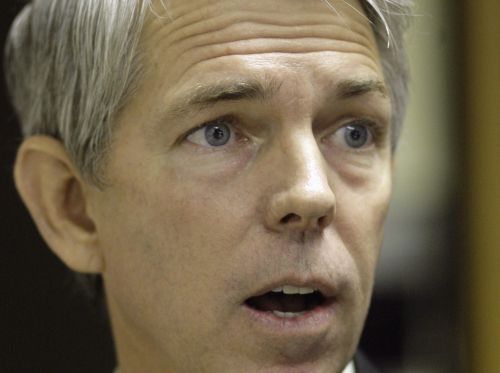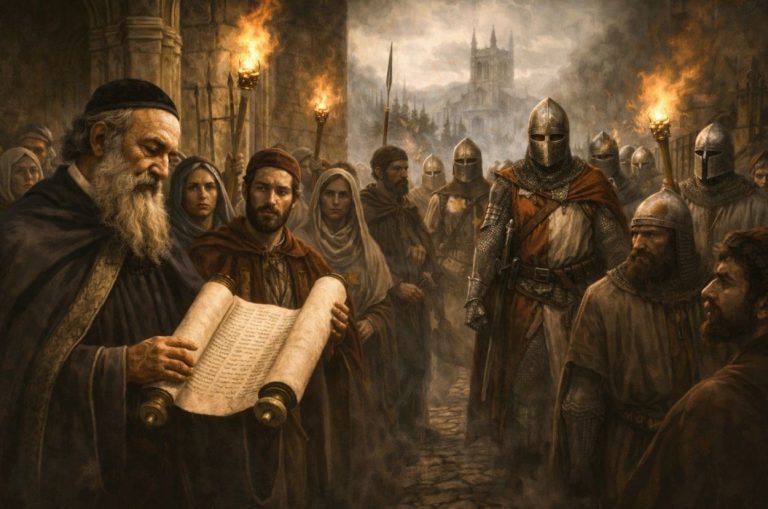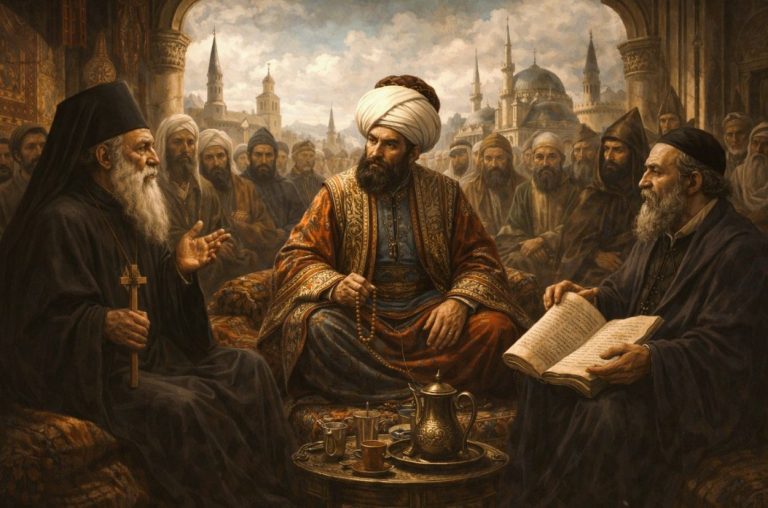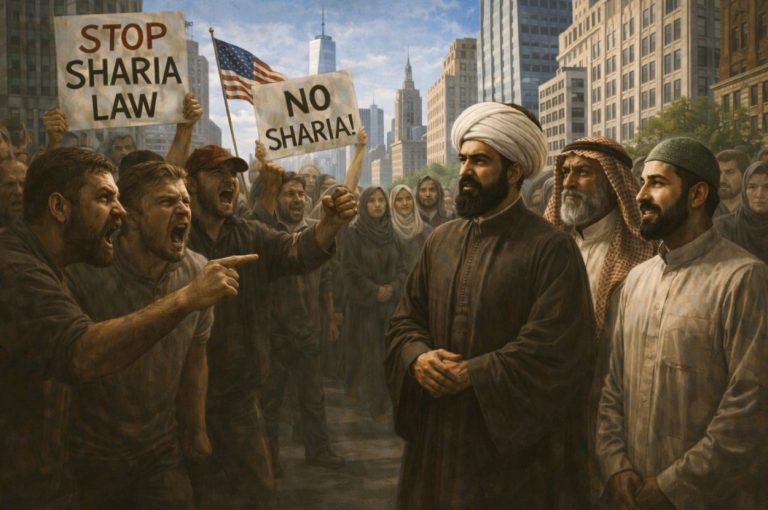

The fight over Barton’s appointment is ultimately about more than one man. It is about whether classrooms will teach history as a discipline of evidence and debate, or as a political story tailored to fit a single ideology.

By Matthew A. McIntosh
Public Historian
Brewminate
Christian Nationalism and the Fight over Texas Education
When the Texas State Board of Education tapped David Barton as an “expert content adviser” for its sweeping social-studies overhaul, historians and watchdogs sounded an immediate alarm. Barton, a conservative activist who leads the group WallBuilders, has long promoted the idea that America was founded as a Christian nation and that the separation of church and state is a “myth.” His new role gives him direct influence over standards that will shape Texas textbooks and classrooms through 2030, with ripple effects far beyond the state.
But Barton’s credentials as a historian are widely disputed. Major publishers and conservative scholars alike have documented factual errors and selective quotations in his work. In 2012, Thomas Nelson, the largest Christian publisher in the U.S., withdrew his book The Jefferson Lies, citing “a loss of confidence” and admitting that “basic truths just were not there.” The Southern Poverty Law Center lists him as a prominent figure in the Christian nationalist movement, and outlets from Vox to the Texas Freedom Network have catalogued his record of misrepresentation.
Now, with Barton advising on the very standards that guide what children in Texas learn, critics warn that pseudo-history is on the verge of becoming state policy. The debate isn’t just academic; it’s about who controls the story of America, and what the next generation of students will be taught to believe.
Who is David Barton and Why His Appointment Matters
David Barton is not a historian by training, though he frequently presents himself as one. His only academic credential is a bachelor’s degree in religious studies from Oral Roberts University, earned in 1976. Despite having no formal education in history or law, he regularly calls himself an “expert in historical and constitutional issues,” a claim widely rejected by professional scholars.
Barton founded WallBuilders, an organization dedicated to promoting what it calls America’s “forgotten history” and “biblical foundations.” In practice, that mission has meant advancing the argument that the United States was created as a Christian nation and that secular interpretations of the Constitution are distortions. The Southern Poverty Law Center has profiled Barton as a key figure in the Christian nationalist movement, noting that he often dismisses the separation of church and state as a modern fabrication.
His influence extends far beyond his own books and speaking tours. For decades, Barton has been a behind-the-scenes force in conservative politics, advising Republican candidates, hosting events like Texas Faith Fest alongside GOP leaders, and serving as a bridge between political activism and religious mobilization. His appointment to the Texas State Board of Education carries particular weight because Texas is one of the nation’s largest textbook markets. Decisions made there about what is included, or excluded, in official standards often shape what publishers print nationwide.
The timing underscores those stakes. The board recently approved a framework that shifts classroom time toward Texas and U.S. history, while scaling back the study of world cultures and global history. Critics worry that this narrowing makes it easier for ideological agendas to dominate the standards, and Barton’s presence at the table signals exactly that risk.
Barton’s Documented Record of Errors and Retractions
Barton’s claims about America’s founding and its key figures have been scrutinized for decades, but the most visible rebuke came in 2012, when his book The Jefferson Lies was pulled from shelves by its own publisher. Thomas Nelson, one of the largest Christian publishers in the country, announced that it had “lost confidence” in the book’s details and acknowledged that “basic truths just were not there.” Brian Hampton, the publisher’s senior vice president, said bluntly that there were “matters of fact…not supported at all.”
The retraction was not led by secular critics but by conservative scholars themselves. Historian Jay W. Richards of the Discovery Institute reviewed Barton’s work and concluded it contained “embarrassing factual errors, suspiciously selective quotes, and highly misleading claims.” A group of evangelical historians likewise warned that Barton’s portrayal of Jefferson distorted the historical record. Of important note is that Richards serves as Director of the DeVos Center for Human Flourishing and the William E. Simon Senior Research Fellow at The Heritage Foundation, a heavily conservative think tank. Widespread rejection of Barton comes not only from without but also within his own political circles.
Outside academia, watchdogs have compiled exhaustive lists of Barton’s misrepresentations. Americans United for Separation of Church and State published a dossier cataloguing dozens of instances where his claims about constitutional law and the Founders collapse under primary-source evidence. Vox has described him as “the fake historian behind America’s religious right,” noting how his work circulates in churches, classrooms, and political speeches despite being rejected by professional historians.
These episodes mark Barton not simply as a controversial figure, but as one whose central claims have been rejected by both secular and religious scholars. Despite that, his influence has only grown, culminating in his official role helping decide what millions of Texas students will be taught about the nation’s past.
What the 2025 Texas Standards Fight Is About
The Texas State Board of Education is in the midst of a sweeping revision of K-8 social-studies standards, a process that will determine what publishers print and what millions of students study for the next generation. The changes are scheduled to be finalized by June 2026, with classroom rollout planned for 2030.
This year, the board approved a new framework that expands classroom time for Texas and U.S. history while scaling back world history and global cultures. Supporters argue that it will strengthen civic literacy and cultivate “well-educated, proud Texans and patriotic Americans.” Critics counter that the narrowed scope risks isolating students from global context and makes it easier for political agendas to shape the narrative.
These debates are not merely about emphasis but about interpretation. By placing Barton in a position to advise on the content, the board has signaled a willingness to entertain revisions aligned with Christian nationalism, a move actual historians warn could institutionalize pseudo-history at the expense of evidence-based scholarship.
How Barton’s Views Intersect with the Standards
Barton’s influence on Texas education is not new. During the 2010 standards revision, he advised the board to reduce references to civil rights leaders like César Chávez and Thurgood Marshall while pressing to elevate conservative figures, including Phyllis Schlafly and Newt Gingrich. He has also argued that the Founders never intended a strict separation of church and state, framing the Ten Commandments as a “foundational” element of American law and education.
Those positions align with the current framework’s emphasis on patriotism and U.S.-centric content. By centering Texas and American history, critics warn, the standards create space for Barton’s brand of revisionism: presenting the nation’s founding as explicitly Christian, casting doubt on secular interpretations of constitutional law, and diminishing the role of diverse voices in American history.
Barton himself has long argued that students should be taught a heroic narrative of the Founders rather than what he calls the “negative” focus on slavery and systemic inequality. That perspective dovetails with recent conservative pushes to limit discussions of race, gender, and global history in classrooms. With Barton advising, scholars fear the board will codify these narratives into official standards that every Texas student, and every publisher seeking access to the state’s massive textbook market, will be forced to follow.
Supporters’ Case for Barton
Not everyone on the board views Barton’s appointment as controversial. Republican members have defended the decision as a reflection of their constituents’ priorities and values. SBOE member Brandon Hall said he had received “the vast majority” of feedback in support of Barton’s role, describing the reaction from his district as “very positive.”
Other GOP members framed the overhaul as a chance to instill pride and patriotism. In a joint statement, board members Julie Pickren and Hall argued the standards should “produce well-educated, proud Texans and patriotic Americans,” echoing Barton’s long-standing message that students should be taught a celebratory view of U.S. history.
For Barton’s supporters, his lack of formal training in history or law is less important than his ability to connect America’s founding to biblical values and conservative political philosophy. They see him not as a liability but as a culture warrior whose vision aligns with their effort to shape the next generation’s understanding of the nation’s past.
Critics’ Warnings from Historians and Watchdogs
Professional historians and education advocates have been blunt about their concerns. Carisa Lopez of the Texas Freedom Network called Barton’s appointment a “flashing red light” that the standards process is headed into “a political swamp of misinformation and distortions.”
The Southern Poverty Law Center notes that Barton has spent decades promoting Christian nationalism and downplaying church-state separation, labeling him an extremist voice in public life. The Texas Freedom Network has tracked years of Barton’s claims that collapse under scrutiny, from misquoting the Founders to presenting fabricated statistics about religious practice in early America.
Even conservative evangelical scholars have raised alarms. Historians Thomas Kidd and Barry Hankins wrote that Barton’s methods amount to “source-mining,” lifting quotations out of context to support a predetermined narrative. To them, Barton’s work is not simply sloppy but fundamentally incompatible with the discipline of history.
Together, these critics warn that Barton’s presence in the standards-writing process threatens to turn ideology into curriculum. Instead of history grounded in evidence and complexity, Texas students may be taught a version of the past tailored to a single political and religious vision.
What’s Verifiably False?
For years, Barton’s critics have catalogued examples where his claims collapse under basic fact-checking.
The clearest case is his book The Jefferson Lies, which Thomas Nelson withdrew in 2012 after concluding “basic truths just were not there.” Senior Vice President Brian Hampton explained that the publisher found “matters of fact…not supported at all.”
Conservative scholar Jay W. Richards likewise reviewed Barton’s work and found “embarrassing factual errors, suspiciously selective quotes, and highly misleading claims” First Things. Similarly, WORLD magazine documented evangelical historians’ concerns that Barton was distorting Jefferson’s religious views for political purposes WORLD.
Watchdog groups have pulled together dozens of other instances. As stated earlier, Americans United for Separation of Church and State published a comprehensive dossier, listing claims ranging from fabricated quotations to misreadings of constitutional law. Vox has described him as “the fake historian behind America’s religious right,” underscoring how his narratives persist in churches and political circles despite being debunked.
These are not minor disputes over interpretation. They are instances where Barton’s central arguments were shown to be factually wrong, and in the case of The Jefferson Lies, so inaccurate that even a sympathetic publisher refused to stand behind them.
What’s at Stake for Classrooms and Publishers
Texas’ decisions on curriculum standards ripple far beyond its borders. As one of the largest textbook markets in the country, what Texas demands often determines what national publishers print. When Barton sits at the table as an adviser, his interpretations are not confined to the Lone Star State; they have the potential to be baked into materials that reach classrooms nationwide.
The current overhaul magnifies those risks. By shifting more classroom time to Texas and U.S. history while cutting back world history and global cultures, the framework leaves less space for diverse voices and global perspectives. Critics argue this narrowing makes it easier to inject partisan or religiously motivated narratives into lessons, especially those surrounding the nation’s founding and constitutional principles.
For educators, the concern is that students could emerge with a skewed understanding of history, one that prioritizes patriotic mythology over evidence and inquiry. For publishers, the stakes are commercial as well as ethical: meeting Texas’ demands may mean printing books that embed Barton’s views, and those editions often become the de facto standard in other states that buy from the same presses.
In short, the fight is not just about what Texas students will learn in 2030. It’s about how a state-driven agenda could reshape the teaching of history across the country.
What Happens Next
The standards overhaul is still in motion. The State Board of Education plans to finalize the new social-studies framework by June 2026, with implementation set for 2030 classrooms. Between now and then, there will be multiple public hearings, draft releases, and opportunities for additional advisers to weigh in.
That process is likely to be contentious. Advocates will press for standards that reflect historical complexity and diverse perspectives, while Barton and his allies are expected to continue pushing for a vision of history that emphasizes America’s Christian and patriotic foundations. Publishers, too, will be watching closely, since their next generation of textbooks will have to align with whatever the board approves.
In other words, Barton’s appointment is not the end of the story, it is the beginning of a long fight over how Texas, and potentially the nation, will frame the past for its students.
Quotable Kickers
The warnings about Barton’s role could not be more direct. When The Jefferson Lies was withdrawn in 2012, Barton’s own publisher acknowledged the gravity of the errors: “basic truths just were not there,” senior vice president Brian Hampton explained NPR. For many scholars, that moment was proof enough that Barton’s version of history does not withstand scrutiny.
More than a decade later, critics see Texas risking the same mistake, only this time on a statewide scale. “This is a flashing red light,” said Carisa Lopez of the Texas Freedom Network, warning that the curriculum rewrite is veering into “a political swamp of misinformation and distortions.”
The fight over Barton’s appointment is ultimately about more than one man. It is about whether classrooms will teach history as a discipline of evidence and debate, or as a political story tailored to fit a single ideology. And in Texas, where the textbooks go, the nation often follows.
Originally published by Brewminate, 10.03.2025, under the terms of a Creative Commons Attribution-NonCommercial-NoDerivatives 4.0 International license.


